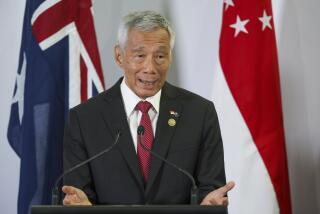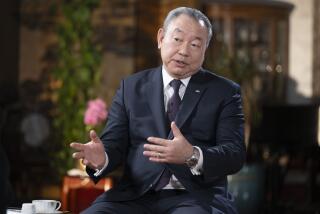Taiwan’s Lee Inaugurated, Offers to Visit China
- Share via
TAIPEI, Taiwan — In a capital festooned with flags and banners, Lee Teng-hui was inaugurated today as Taiwan’s first popularly elected president, capping the island’s 10-year march to democracy.
With a portrait of Nationalist Party founder Sun Yat-sen as his backdrop, the president raised his right arm high and somberly took the oath of office at the Presidential Palace in central Taipei.
“I take this oath before my countrymen to abide by the constitution, increase people’s welfare and protect the country,” Lee said. Moments later, Prime Minister Lien Chan, Lee’s running mate, took the oath as vice president.
In his inauguration address, Lee, 73, was applauded loudly when he offered to visit mainland China to meet with Communist Party leaders. Tensions between Taiwan and the mainland reached a critical state earlier this year when Beijing staged a series of massive military maneuvers in the Taiwan Strait.
Lee was conciliatory in his speech, calling for an end to the “tragedy of Chinese fighting Chinese.”
Using language designed to calm Beijing, Lee ruled out full independence for Taiwan, calling it “unnecessary and impossible.”
“I am deeply convinced that the Chinese people shall complete the historical test of peaceful unification in the 21st century,” he said.
However, he also said that Taiwan would not abandon its policy of “pragmatic diplomacy,” through which the island has sought a seat in the United Nations and bilateral relations with other countries.
Despite the international acclaim won by Taiwan for its evolution from martial law to multi-party democracy in just over a decade, the inauguration was shunned by most world governments, who were fearful of irritating Beijing.
Only eight heads of state, mainly from African and Central American countries, attended the inauguration. The United States, which officially recognizes only the government of mainland China, was represented in an unofficial capacity by civil rights leader Vernon Jordan. Eleven members of Congress also attended the inauguration, likewise in an unofficial capacity.
Taiwan’s rapid march to democracy began in 1986, when the government permitted the founding of the island’s first opposition party, the Democratic Progressive Party, formed by former dissidents.
Then, in 1987, Nationalist Party leader Chiang Ching-kuo, the son of Gen. Chiang Kai-shek, announced the lifting of martial law, ending four decades of authoritarian rule.
When Chiang Ching-kuo died in 1988, he was succeeded as president by Lee, his vice president. Under Taiwan-born Lee, the island held its first parliamentary elections in 1992 and set the stage for the first presidential election in March--which he won with 54% of the vote.
More to Read
Sign up for Essential California
The most important California stories and recommendations in your inbox every morning.
You may occasionally receive promotional content from the Los Angeles Times.










